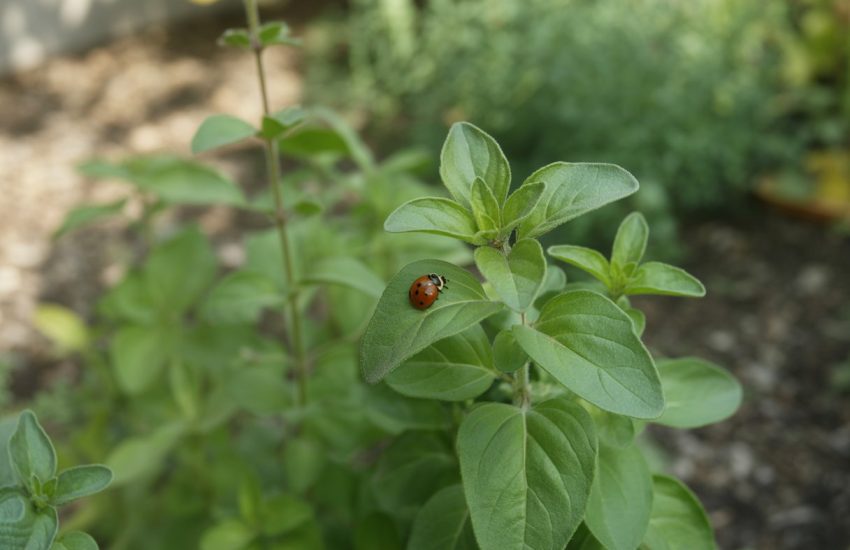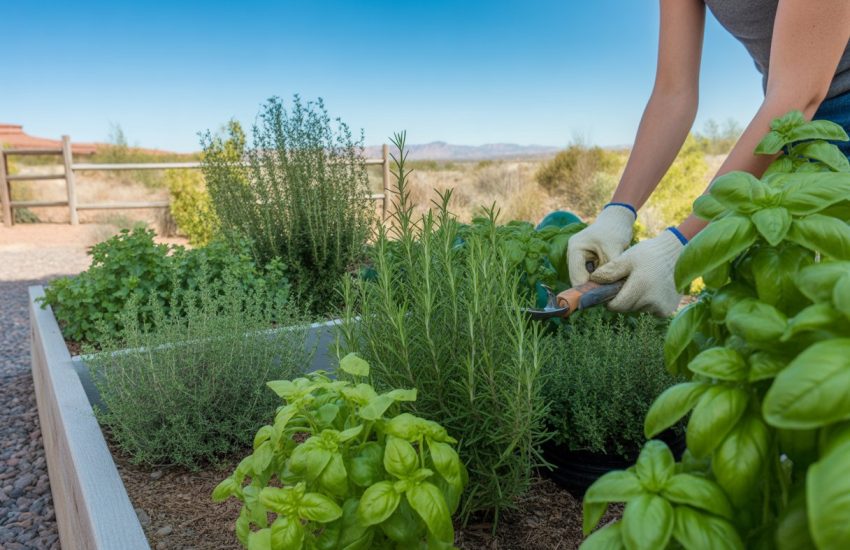Deciduous and Evergreen Trees
Last updated: February 8, 2026
Introduction
Trees and plants have always warmed people’s hearts with their presence. We feel peaceful when we see the colorful flowers that bloom on trees and the different kinds of fruits they have. For this reason, people have always liked to grow plants and trees in their areas. Fortunately, there is a wide variety of plants, and it is possible to have a beautiful garden regardless of the climate where you live.
People try to create a garden that will be the envy of neighbors, with various plants, different flowers, and trees to cool off in the shade. For this reason, the maintenance of gardens and the issues of which plants should be grown in the garden are important. Every plant does not grow in the same climate zone, you should know the climate of the region you live in and plant accordingly.
This is especially vital for trees because you cannot replace a tree, unlike smaller plants. Trees have different classifications according to their different features. For example, Deciduous and evergreen trees are two different types. Evergreen trees remain green all year and do not shed their leaves however, deciduous trees shed their leaves in certain seasons. There are various deciduous and evergreen trees, and they all have different beauties.
Which Trees Don’t Lose Leaves in Winter?
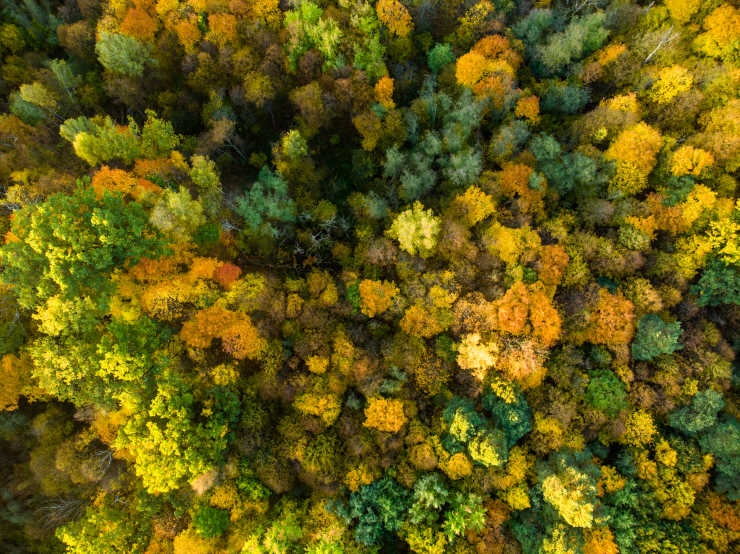
We mentioned that deciduous and evergreen trees are two different types. Evergreen trees do not lose their leaves in winter. The general characteristics of these species are that they don’t have large leaves. Since they have smaller or needle-like leaves, cold weather doesn’t affect them significantly. Now let’s see what trees do not lose their leaves in winter.
Pine trees are one of the evergreen species. They have a very long lifespan. Although there are different types of pines, they generally have similar physical characteristics. These trees have needle-like leaves instead of large leaves. This makes them resistant to cold. Of course, they shed some of their needles, but still, trees keep most of their leaves and remain green.
Like Pine trees, Fir trees also have needle-like leaves and cones. Although they look very similar, fir trees have shorter needles. They differ from pine trees in terms of their habitat. Pine trees can grow in different climates, but fir trees grow in colder regions. They can also be distinguished from other similar trees by their scent. These cold climate plants don’t shed their leaves in winter.
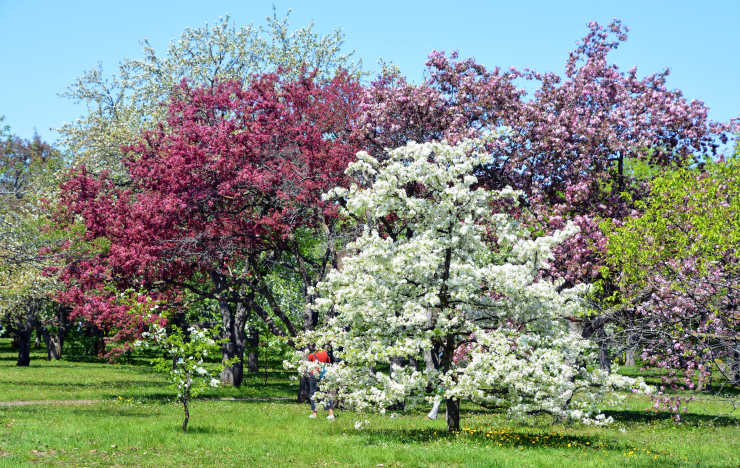
One of the trees that don’t shed their leaves in winter is the holly tree. Snowfall on their green leaves and red berries create a beautiful image, and they are the symbol of Christmas. Cedars are also evergreen. These trees have a yellowish-green color and needle-like leaves and require sunlight very much.
Murray and Leyland Cypress also do not shed their leaves in winter. They are not as large as other evergreen trees and are preferred in gardens as they provide a privacy wall with their dense leaves. Spruce trees are evergreen. They keep their leaves during winter, however, they have weak roots. So they can be affected by winds and storms easily.
What Grows Fast and Tall for Privacy?
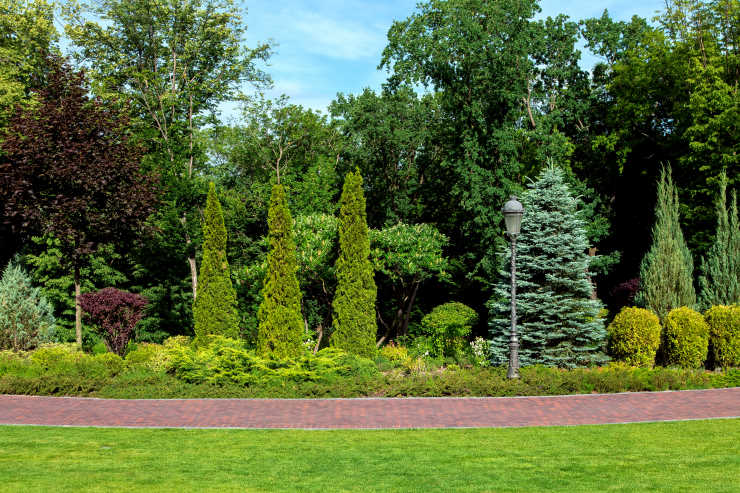
Growing tall plants with dense leaves in your garden can provide important advantages for different reasons. You can keep your garden away from curious eyes by planting these trees on the borders of your property. So you can get some privacy when spending time with your family. In addition, tall trees cut the sun and wind, allowing you to spend more quality time in the garden.
Different deciduous and evergreen trees can provide privacy, but the important thing is how fast these trees grow. Let’s learn about the trees that reach the ideal size in a short time and provide privacy as soon as possible. Murray and Leyland Cypresses are the most preferred trees in the garden. They are evergreen, and nobody can see inside your garden when you have them.
Thujas have triangular shapes, tall heights, and dense leaves, so they are one of the best trees for privacy. You can plant this tree on the borders of your garden. Since thujas are evergreen, don’t shed their leaves. It will keep your garden away from other people’s eyes throughout the year. Additionally, they cut the wind and provide shade.
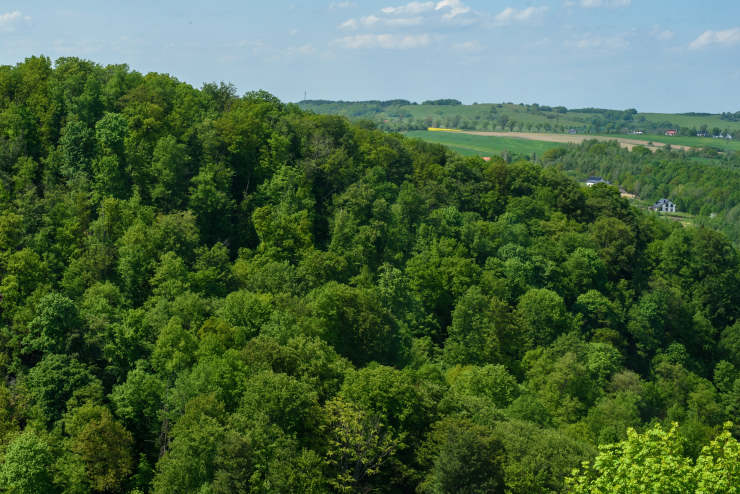
Lombardy Poplars have similar physical characteristics to Thuja. They have green and dense leaves. They also grow very fast. That is why they are highly preferred for privacy. Lombardy Poplars are very tall, but they are not very wide. This makes it possible to plant plenty of Lombardy Poplars in a row to cover your garden fully. But they are deciduous tree species. So you can’t constantly use it as a privacy Wall.
The Rose of Sharon isn’t very tall, but it’s still wide, providing privacy. These plants give beautiful flowers in the summer. In other words, it is a plant different from the ones we mentioned above and will add color to your garden. By the way, don’t be fooled by the name, this is not rosewood. This will shed their leaves in winter like Lombardy Poplars.
Which Trees Shouldn’t I Plant in My Yard?
Although plants are often a source of beauty for your garden, you should be careful about the plants you grow. Because some plants may not be very suitable for living with other plants, or they can be vulnerable to diseases and infect other plants. Here are some plants you should not consider growing in your garden.
Ginkgo trees are one of the species you should stay away from. The female Ginkgo trees bear fruit, and these fruits smell very bad. Having these in your garden can cause constant exposure to a bad smell. Moreover, the female ones of these trees are also toxic to dogs. Even if you don’t have a dog of your own, it can harm any dog ??that enters your garden.
Mulberries have very aggressive roots. This is why they are not very suitable for living with other plants. Roots can reach the other plants’ living areas and take their nutrients. If you like to have various plants in your garden, you’d better stay away from this tree. In addition, if you do not pick the fruits, they will fall on the ground and attract many insects.
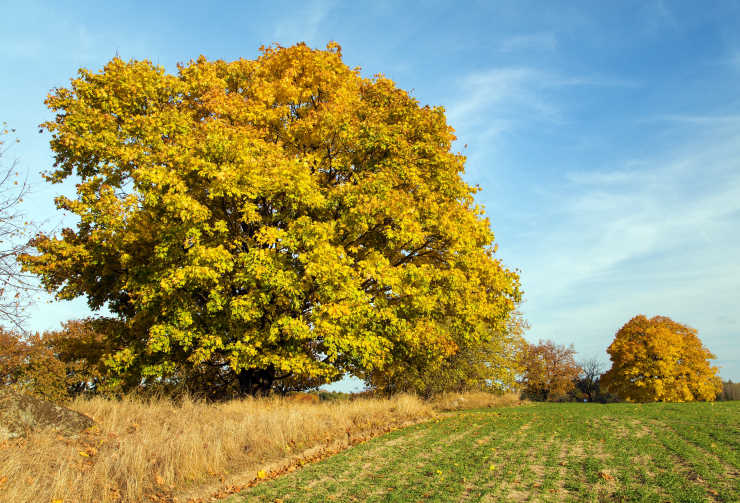
Actually, Silver Maples are the trees that will please you. You can have a pleasant time in their shades, but in some cases, they can be dangerous. These trees don’t have strong roots, so in a strong wind or storm, they can be uprooted and directly harm you, your family, or your property. We suggest you avoid growing these trees near your house.
Finally, mimosas, which attract attention with their beautiful appearance, are one of the plants that will not please you very much. Mimosas are very vulnerable to diseases. They can get sick easily and can give you a lot of trouble. If you don’t want to deal with a diseased plant in your garden all the time, you should stay away.
Which Trees Increase Property Value?
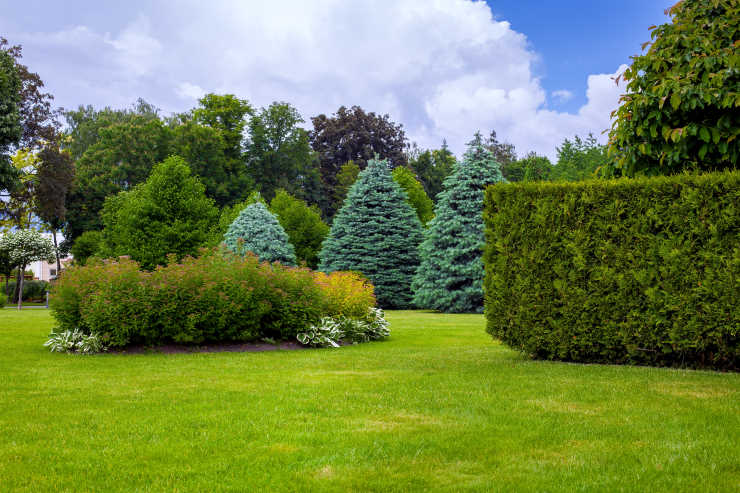
We mentioned the trees that are not very pleasant to have in your garden. So, what are the trees that will both please you while growing and increasing the value of your property? Different deciduous and evergreen trees will increase the value of your property. These trees are generally healthy and hardy species. They are not easily infected and have a long life span.
Oak trees are one of the most preferred species with their long lifespan and durability. They look good in your garden and do not cause trouble because they are resistant to diseases and insects. It is better to have trees known for their durability in your garden than to grow diseased trees just because they are different and exotic.
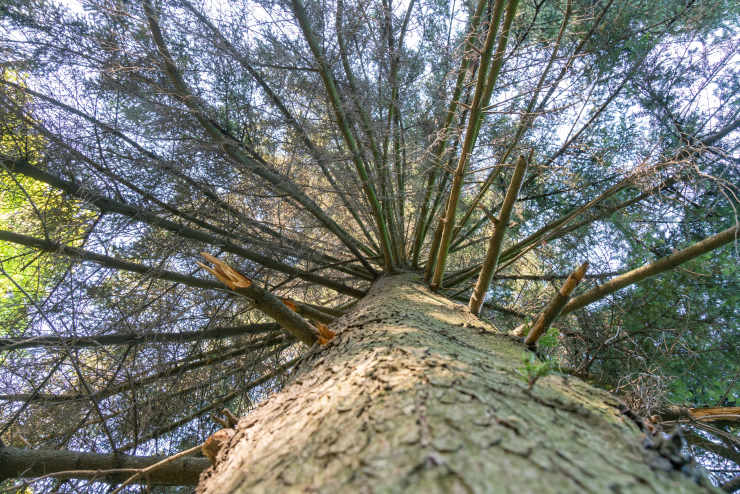
Moreover, there are many different types of oak trees. Different types can grow in different climate zones, so wherever you live, you can grow a resistant oak tree in your garden. Although all of these species have different sizes, they can reach a minimum of 40 and a maximum of 80 feet long. They like sunlight and need it to grow.
Other than oak trees, magnolia trees are also one of the plants that will increase your property’s value. They are evergreen and bloom white or pink flowers in the spring. They have thick and dark leaves. There are different types of magnolia trees. They are very beautiful, and they attract people’s attention. They will boost your property’s value.
Some maple trees can make your garden look better than it is. Sugar and Red Maple trees are two of the best trees to raise on your property. These species, which can reach up to 60 feet, provide a warm atmosphere to your garden with their flowers. It will be appreciated by everyone who sees your garden.
Which Trees Don’t Need Water?
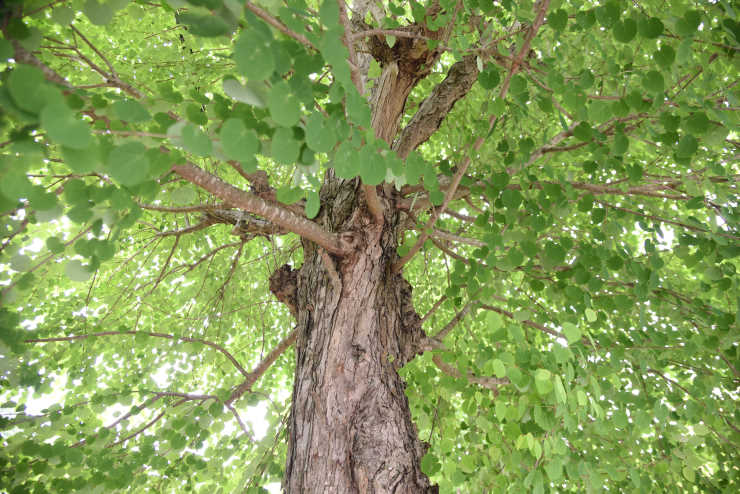
Some plants can be more drought tolerant. These are more suitable for growing in warm climates. A small amount of water will be sufficient for these kinds of plants. Too much water can cause damage to the plant. For this reason, it is important to know the plant you want to grow well. Let’s look at the deciduous and evergreen trees resistant to drought.
Bur Oak, a type of Oak, is one of these plants. It is a huge tree, but the water requirement is low. They are indeed a very hardy species, therefore, they can live for a very long time. However, Bur Oak would be more suitable for larger properties. It can be too big for small gardens after a certain time. Other types of oaks are drought resistant.
Red cedar is also evergreen and grows mostly in arid areas. It doesn’t require a lot of water. These are very durable trees also suitable for growing in the garden. They are not only drought tolerant but also do not have special demand on the soil. It does not need rich nutrients to grow.
Pines also do not need much water. The main reason for the low water needs of pines is the structure of the leaves. They have needle-like leaves. These do not require so much water. Trees with large leaves need more water to keep their leaves alive. For this reason, you can raise a pine tree if you are looking for a tree that does not require too much water.
Among the deciduous species, some maples have a low need for water. Red and paperbark maples are the two species that are drought tolerant. Elms, a very large species, are also deciduous trees with low water needs. Apart from these, not many tree species need low water. Because trees are big, they have more requirements to stay alive. But there are smaller types of plants that are drought resistant.
Conclusion
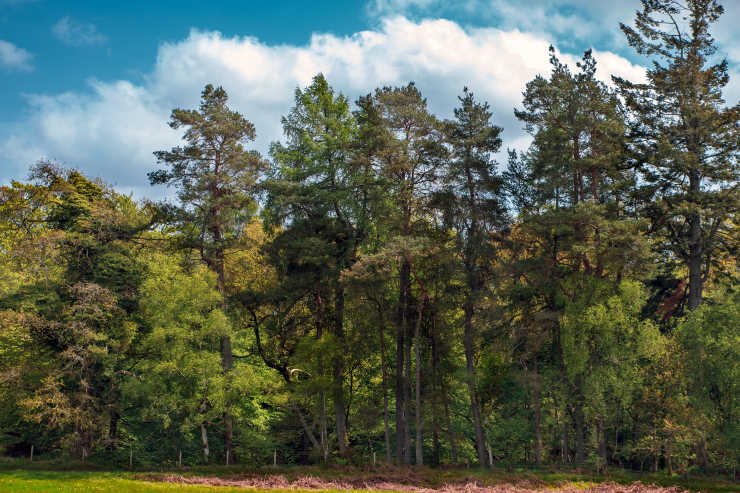
Nature has always been a place where people can reach their inner peace. For this reason, we always look for a way to return to nature no matter what. If you live in a house with a garden, it is even easier to reach peace. You can create a beautiful space for yourself by growing plants that you will like in your garden.
Trees are essential for gardens. Because most of the trees are very durable, it will be better for you to grow trees in your garden along with your delicate flowers. In this article, we talked about deciduous and evergreen trees. We have informed you about the different characteristics of the trees. So, you can choose the most suitable tree according to your living area.
We have mentioned many types that will provide privacy for your garden. Likewise, we informed you about the species you should keep away from your garden and the trees that will increase the value of your house. We talked about the plants that need low water. Based on this article, you can choose the most suitable plant for yourself.
You may also be interested in:
How to Choose the Right Seed for Shrubs and Trees
Causes of Patchy Grass: Solutions for a Receding Lawn
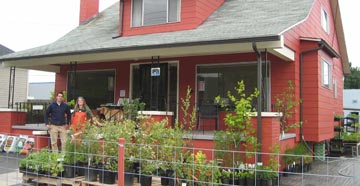 Looking for a nursery that carries native trees?
Looking for a nursery that carries native trees?
Browse our native plant nursery directory

